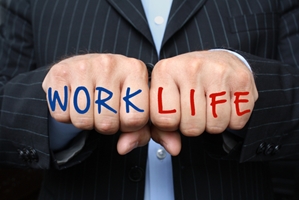
Spring has finally arrived, and with it, vacation season is in full bloom. Next to summer, spring break is among the most common times of year in which employees like to take some time off in order to remove themselves from the daily grind and enjoy quality time spent with their spouses and children.
There are those, however, who continue to plug away, coming in and leaving at their standard time, despite having personal time off that's accrued. While some may be doing this because they truly prefer to work, a new poll suggests that some may be keeping their nose to the grindstone for fear of what may happen if they take an extended break.
Fear of being replaced is keeping many Americans from using their vacation time, according to a recent survey conducted jointly by GfK Public Affairs and Corporate Communications on behalf of the U.S. Travel Association. Other rationales for not taking time off include worries about not being able to catch up from all the work that goes unaddressed.
Though time off is considered to be among the most desired employee benefits, a substantial percentage of today's consumers don't wind up using their allotment in a given year. The poll found that 40 percent of American workers leave vacation days on the table.
Roger Dow, president and CEO of the U.S. Travel Association, indicated that though they may not realize it, many people display symptoms of what's come to be known as a work martyr complex.
"In part, it's because 'busyness' is something we wear as a badge of honor," said Dow. "But it's also because we're emerging from a tough economy and many feel less secure in their jobs."
He added that workers may feel like their stick-to-itiveness is getting them ahead, it actually winds up doing more harm than good in the long run, evidenced by deteriorating mental health stemming from burn out. Personal relationships workers have with their friends and family often suffer as well.
But the so-called workplace martyr complex can be overcome by employers communicating more effectively with their staff, Dow stressed.
"Companies and employees need to recognize the value of getting away from the office," he said. "It's time to start a conversation and reclaim the benefits we work so hard to earn."
46 percent of employers check emails on vacation
Employers can start by being more vacation-minded themselves when they're on holiday. According to the study, close to half of all management keep responding to their emails even while they're supposed to be on break. Around 30 percent said that they return phone calls that they might have missed that are work-related.
Ever increasingly, work and vacation are overlapping one another. A separate poll from TripAdvisor found that more than three-quarters of full-time employees have worked in some capacity while on vacation. Many of these work-related activities were done much more frequently than the global average. For example, 91 percent of U.S. respondents said that they checked their email, compared to just 65 percent among workers polled from other countries, including Australia, Brazil, France, Germany and Italy. There was an even bigger disparity among those who responded to the emails they received. Roughly 85 percent of U.S. participants said that they replied to these emails, versus a global average of just 56 percent.
Human resources experts encourage business owners to not underestimate the value of time off. They should also be sure to communicate its importance to their employees so that they can recharge their batteries, helping them to be more productive as a result.





